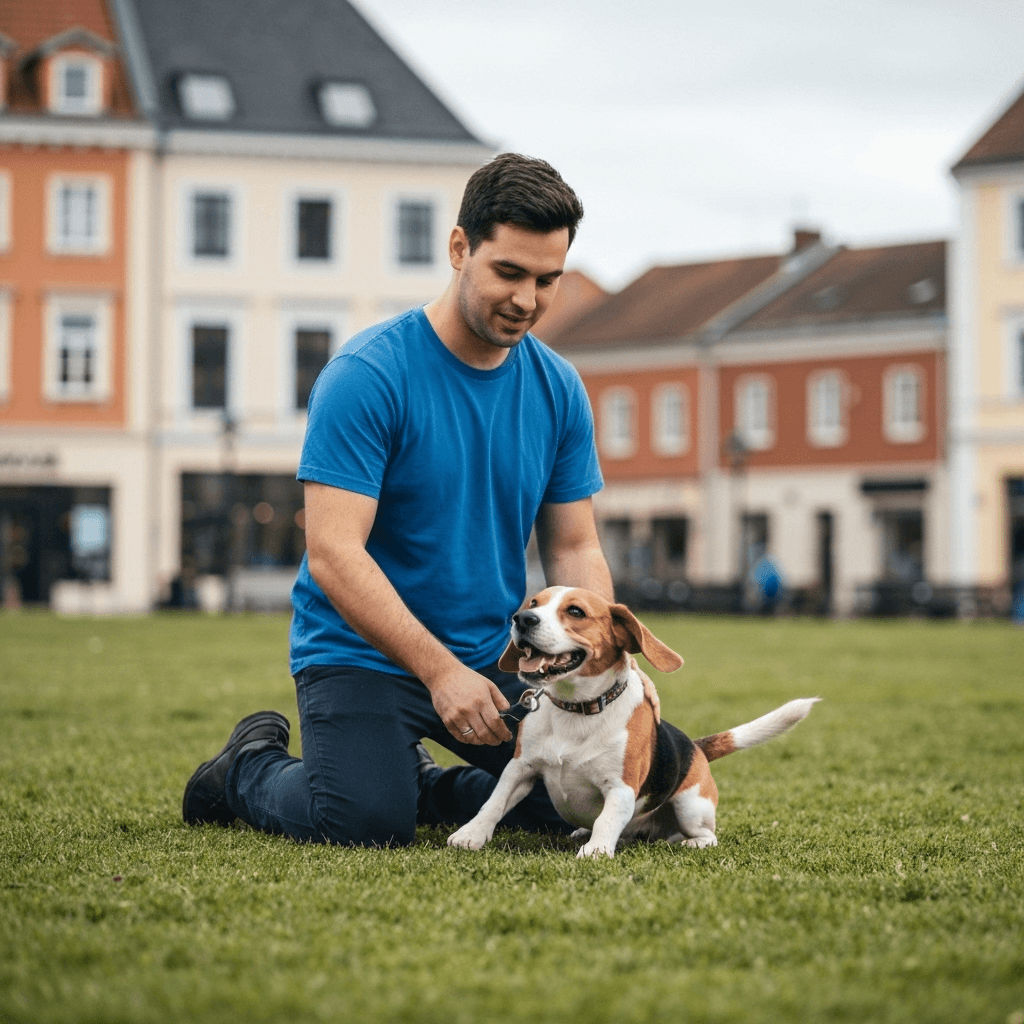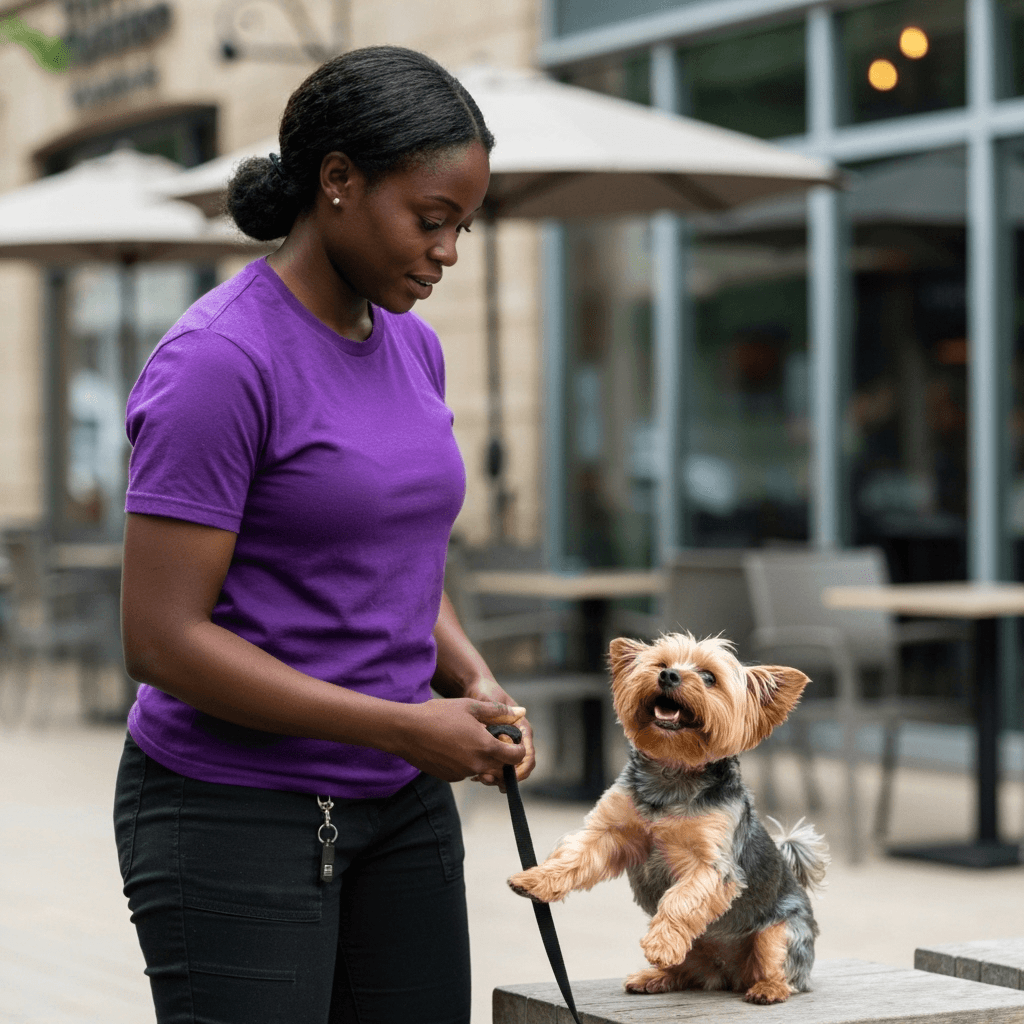Your Complete Guide to Choosing a Dog Trainer in Buffalo
Living with a dog in Buffalo means you’ll face unique challenges every day. Your dog needs to stay calm walking past the crowds in Elmwood Village, sit politely on patios in Allentown, and handle the excitement of game days across South Buffalo and North Buffalo.
The right training helps your dog succeed in these real situations, not just during practice sessions. And working with someone who knows Buffalo makes a difference because they understand the local rules and daily realities you’ll actually encounter.
How to Choose the Right Trainer
Start by looking for trainers who use positive reinforcement methods. These reward-based approaches build your dog’s confidence and keep stress low, which matters when you’re trying to practice skills around the busy crowds at Canalside or cyclists along the Outer Harbor.
Credentials give you a way to compare trainers’ experience and training. Look for certifications like CPDT-KA and KPA-CTP. If your dog has serious behavior problems, ask about IAABC-CDBC certification or science-based programs like CTC.
Think about whether you need in-home sessions or group classes. In-home training works great for problems like door greetings, window barking, or pulling on neighborhood walks. Group classes help once your dog can focus around other dogs, but before you try crowded spots like Hertel Avenue.
One thing many people don’t think about is permits. If a trainer wants to hold sessions in city or county parks, they might need special permission and insurance. Ask about this if you’re planning to train in public spaces.
Common Dog Training Methods Explained

Basic obedience covers the essentials like sit, down, stay, place, recall, and loose leash walking. These skills help your dog handle elevators, busy sidewalks, and restaurant patios without pulling or jumping on people.
Puppy training focuses on the early stuff that prevents bigger problems later. This includes potty training, getting comfortable with crates, leash training, meeting new people and dogs safely, and learning to stay calm during outings.
Behavior modification tackles tougher issues like fearfulness, reactivity toward other dogs, resource guarding, and separation anxiety. Good behavior programs use gradual exposure and positive associations, with clear safety plans to keep everyone comfortable.
Private lessons and in-home dog training let you work on your specific challenges in your actual environment. Day training can speed things up when your schedule is packed, since the trainer works with your dog during the day.
Group classes give your dog practice around distractions. The best classes manage space carefully, screen dogs before they join, and know how to help both shy and overly excited dogs succeed.
Board and train programs can work, but make sure you know exactly how your dog will be handled each day. You’ll also need clear lessons on how to maintain the training once your dog comes home.
For specialized goals like therapy dog training or service dog training, you’ll need a trainer with experience in public access skills and structured programs that meet legal requirements.
Average Cost of Dog Training in Buffalo (Updated for 2025)
Training costs in Buffalo and Erie County depend on the trainer’s experience, how long sessions last, and where you meet. Here’s what local dog owners typically pay in 2025:
| Service Type | Average Cost (Buffalo/Erie County) | What’s Typically Included |
|---|---|---|
| Puppy classes (4–6 weeks) | $140–$250 total | Socialization, potty schedule, basics |
| Group obedience classes (4–6 weeks) | $160–$300 total | Basic skills with distractions |
| Private lessons (60–90 min) | $90–$160 per session | Customized coaching, homework |
| In-home coaching packages (4–6 visits) | $380–$800 total | Skills at home and in neighborhood |
| Day training (trainer works your dog) | $400–$850 per week | Pro sessions + owner handoffs |
| Behavior consult (initial) | $125–$225 | Assessment, safety plan, goals |
| Board and train (2–4 weeks) | $1,800–$3,800 total | Daily training, owner transfer sessions |
Some trainers charge extra travel fees if you live outside the main city neighborhoods. Complex behavior cases usually cost more because they take specialized knowledge and more careful planning.
Questions to Ask a Potential Dog Trainer
- What training methods do you use, and how do you keep dogs comfortable and motivated during sessions?
- What certifications do you have, like CPDT-KA or KPA-CTP, and do you keep learning through programs like CPDT-KSA?
- How will you help us practice skills in real Buffalo situations, like busy sidewalks and local dog parks?
- Do you offer in-home visits, group classes, or day training, and which would work best for our goals?
- What exactly is included in your training packages, and how will we track our progress?
- Do you have liability insurance, and can you show me proof?
- If we train in public parks, do you have the permits and insurance the city requires?
- For behavior problems, will you work with our veterinarian if needed?
Local Buffalo Rules and Considerations
Buffalo requires dogs to stay leashed and under control in all public areas except inside designated off-leash dog parks. Keep a standard 6-foot leash for walks, trails, and events around the city.
New York State requires all dogs to have current rabies vaccinations. You can find state guidelines and clinic information at the NYS Department of Health rabies resource page.
Dogs 4 months and older must be licensed in Buffalo. The city explains the process, required documents, and fees on their Dog Licenses page.
Excessive barking can get you in trouble with neighbors, especially in apartment buildings and areas with close-together houses. Working with a professional dog trainer on alert barking and door reactivity helps keep the peace.
If a trainer wants to run commercial sessions in public parks, they may need permits and proof of insurance.
New York doesn’t require special licenses for certified dog trainers, but they still need to follow normal business regulations. Trainers who also board dogs have additional local requirements for zoning, buildings, and health standards.
Local Buffalo Resources for Dog Owners
Buffalo has several great spots for training and socializing your dog. The Barkyard at Ralph C. Wilson Jr. Centennial Park offers separate areas for small and large dogs. Ellicott Island Bark Park in Tonawanda gives you a fenced island setting that’s perfect for practicing recall skills.
Amherst Paw Park provides good space for working on polite greetings with other dogs. Delaware Park’s Ring Road and the loop around Hoyt Lake work well for leashed training during quieter hours.
For urban training, the walkways at Canalside and along the Outer Harbor help dogs practice calm leash skills around strollers and pedestrians. These areas give you controlled exposure to city sights and sounds.
The City of Buffalo Animal Shelter can help with licensing questions, lost and found services, and adoptions. The SPCA Serving Erie County offers microchipping, affordable veterinary services, and other community resources.

Common Questions
How much does in-home dog training cost?
Most Buffalo trainers charge $90–$160 per in-home session. Package deals usually lower the per-visit cost, and complex behavior issues may cost more due to the specialized knowledge required.
Is in-home dog training worth it?
Yes, because it addresses problems where they actually happen. Instead of wondering if your dog will remember classroom lessons at home, you work directly on door greetings, counter-surfing, or barking at people walking by your house.
Can you pay someone to house train your dog?
Many trainers include potty training in their puppy classes or day training programs. You’ll still get coaching on maintaining the schedule and routine, but they can help establish the foundation during the day.
What is the 3-3-3 rule for dog training?
This guideline suggests dogs need about 3 days to decompress in a new situation, 3 weeks to learn new routines, and 3 months to feel fully settled. Good training plans account for this timeline instead of rushing results.
How long will it take to reach my training goals?
Most puppies and friendly adult dogs show good progress within 4–8 weeks if you practice daily. Reactivity, aggression, or deep-rooted fears usually take several months of careful behavior modification work.
What should I bring to group classes?
Pack a flat collar or harness, a 6-foot leash, high-value treats your dog loves, water, and vaccination records if the trainer requests them. Leave retractable leashes at home since they create safety issues in group settings.
What’s the leash law in Buffalo?
Dogs must stay leashed in all public areas unless you’re inside a designated off-leash dog park. Your dog also needs to remain under your control around sidewalks, trails, and public events.
Do I need a dog license in Buffalo or Erie County?
Yes, dogs 4 months and older must be licensed in Buffalo. You can find the process, required documents, and current fees at the City of Buffalo Dog Licenses page.
What shots does my dog need in Erie County or New York?
New York State requires rabies vaccination for all dogs. Check the New York State Department of Health rabies information for current guidelines and clinic locations.
Are dog trainers required to be licensed in Buffalo or Erie County or New York?
No special trainer licenses exist in New York. Trainers follow standard business regulations, though those who also board dogs may face additional local requirements and should carry liability insurance.
Where can I practice off-leash recall?
Fenced dog parks like The Barkyard, Ellicott Island Bark Park, or Amherst Paw Park give you safe spaces for off-leash practice. Start during quieter times when there are fewer dogs and distractions.
Which dog parks allow training around Buffalo?
The Barkyard, Ellicott Island Bark Park, and Amherst Paw Park all welcome training within their fenced areas. Keep sessions short and considerate of other dogs and owners using the space.
What beaches or trails allow dogs for training?
Buffalo doesn’t have ocean beaches, but you can walk leashed dogs on Outer Harbor trails and the paths around Delaware Park. Always check posted signs and give pedestrians and cyclists plenty of space.
Do trainers need insurance to work in parks?
Most professional trainers carry liability insurance even when it’s not legally required. City and county parks may require permits and proof of insurance for any commercial activities, including training sessions.
Finding the right trainer makes all the difference in helping your dog succeed in Buffalo’s unique environment. Look for someone who uses positive methods, understands the local scene, and follows city rules. If credentials matter to you, ask about dog trainer certifications like CPDT-KA, KPA-CTP, IAABC-CDBC, or CTC, and how they stay current with continuing education like CPDT-KSA.
